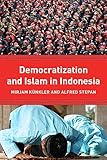Democracy and Islam in Indonesia / ed. by Alfred Stepan, Mirjam Künkler.
Material type: TextSeries: Religion, Culture, and Public Life ; 13Publisher: New York, NY : Columbia University Press, [2013]Copyright date: ©2013Description: 1 online resource (272 p.) : ‹B›Maps: ‹/B›2,, ‹B›Graphs: ‹/B›1Content type:
TextSeries: Religion, Culture, and Public Life ; 13Publisher: New York, NY : Columbia University Press, [2013]Copyright date: ©2013Description: 1 online resource (272 p.) : ‹B›Maps: ‹/B›2,, ‹B›Graphs: ‹/B›1Content type: - 9780231161916
- 9780231535052
- 320.9598 23
- BP63.I5 D457 2013
- online - DeGruyter
- Issued also in print.
| Item type | Current library | Call number | URL | Status | Notes | Barcode | |
|---|---|---|---|---|---|---|---|
 eBook
eBook
|
Biblioteca "Angelicum" Pont. Univ. S.Tommaso d'Aquino Nuvola online | online - DeGruyter (Browse shelf(Opens below)) | Online access | Not for loan (Accesso limitato) | Accesso per gli utenti autorizzati / Access for authorized users | (dgr)9780231535052 |
Frontmatter -- Contents -- Acknowledgments -- Abbreviations -- Chronology -- Maps -- Part I. Introduction -- 1. Indonesian Democratization in Theoretical Perspective -- 2. Indonesian Democracy -- Part II. Attitudes -- 3. How Pluralist Democracy Became the Consensual Discourse Among Secular and Nonsecular Muslims in Indonesia -- 4. Christian and Muslim Minorities in Indonesia -- Part III. Behaviors -- 5. Veto Player No More? The Declining Political Influence of the Military in Postauthoritarian Indonesia -- 6. Indonesian Government Approaches to Radical Islam Since 1998 -- 7. How Indonesia Survived -- 8. Contours of Sharia in Indonesia -- 9. Unfinished Business -- Glossary -- Notes -- Selected Bibliography -- Contributors -- Index
restricted access online access with authorization star
http://purl.org/coar/access_right/c_16ec
Indonesia's military government collapsed in 1998, igniting fears that economic, religious, and political conflicts would complicate any democratic transition. Yet in every year since 2006, the world's most populous Muslim country has received high marks from international democracy-ranking organizations. In this volume, political scientists, religious scholars, legal theorists, and anthropologists examine the theory and practice of Indonesia's democratic transition and its ability to serve as a model for other Muslim countries. They compare the Indonesian example with similar scenarios in Chile, Spain, India, and Tunisia, as well as with the failed transitions of Yugoslavia, Egypt, and Iran. Essays explore the relationship between religion and politics and the ways in which Muslims became supportive of democracy even before change occurred, and they describe how innovative policies prevented dissident military groups, violent religious activists, and secessionists from disrupting Indonesia's democratic evolution. The collection concludes with a discussion of Indonesia's emerging "legal pluralism" and of which of its forms are rights-eroding and rights-protecting.
Issued also in print.
Mode of access: Internet via World Wide Web.
In English.
Description based on online resource; title from PDF title page (publisher's Web site, viewed 02. Mrz 2022)


